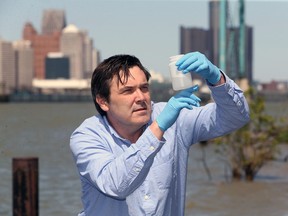
Article content
On the hunt for future pandemics and how to tackle them domestically, the University of Windsor has been named a lead institution in a $15-million research project to help Canada strengthen the biomanufacturing sector, health care supply chains and new technologies in pathogen surveillance.
“During the COVID-19 pandemic, we had supply chain shortages, we couldn’t get enough PPE (personal protective equipment) in Canada, we weren’t making our own vaccines,” said Mike McKay, director of the Great Lakes Institute for Environmental Research at the University of Windsor.
Advertisement 2
Article content
Article content
The Integrated Network for the Surveillance of Pathogens: Increasing Resilience and Capacity in Canada’s Pandemic Response (INSPIRE) will bring together 43 experts from seven universities and public and private agencies in Canada and the United States.
McKay, who is also a founding member of the Ontario Wastewater Surveillance Initiative, will co-lead INSPIRE, along with Lawrence Goodridge, who is director of the Canadian Research Institute for Food Safety at the University of Guelph.
“These collaborations between research hubs, post-secondary institutions and research hospitals will foster innovation across the country,” said Federal Tourism Minister Soraya Martinez Ferrada.
McKay’s research group helped give early warning of COVID outbreaks through their testing of sewage and wastewater. INSPIRE is being funded through the Canada Biomedical Research Fund and the Biosciences Research Infrastructure Fund. Ottawa has set aside nearly $574 million to fund 19 projects.
“Thanks to the work of experienced scientists in institutions at the cutting edge of innovation, Canada will be ready to respond to future health priorities,” said Ferrada
Advertisement 3
Article content
One of the key aims of INSPIRE is to address the weaknesses exposed by the COVID pandemic, said McKay.

It took a massive and innovative effort from Canada’s manufacturing and health care sectors to meet the urgent need for personal protective equipment and other health care supplies that weren’t being produced domestically.
“We need to shore up the ability of the private sector in Canada to meet demands of the health sector in case of another pandemic,” McKay said.
“We must learn from experience to develop proactive strategies to prevent the devastating impact of infectious diseases on the biomanufacturing and health sectors and improve efficiencies moving assets across borders.”

Shanthi Johnson, the University of Windsor’s vice-president of research and innovation, said Windsor’s selection to co-lead INSPIRE is a testament to the confidence the government has in the local university.
“This announcement speaks to our local to global-scale expertise, experiences, and excellence in research and innovation within the University of Windsor, our ability to engage a diverse cadre of experts and trainees and collaborate with other universities, community, and industry partners throughout the province and in the United States,” Johnson said.
Advertisement 4
Article content
Recommended from Editorial
The program will develop strategic partnerships with researchers in Michigan, Ohio, and New York to create a cross-border pathogen surveillance network covering regions where many supply chains supporting Canadian industry originate.
The Cross-Border Institute will study Windsor-Essex’s location in terms of potential biothreats entering Canada. Other local partners include the WE-Spark Health Institute, the Windsor-Essex County Health Unit, and the Municipality of Leamington.
Twitter.com/windstarwaddell
Article content






